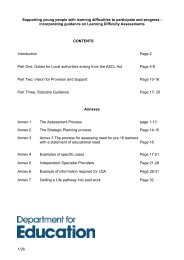Free download of:Excellence in English - Department for Education
Free download of:Excellence in English - Department for Education
Free download of:Excellence in English - Department for Education
You also want an ePaper? Increase the reach of your titles
YUMPU automatically turns print PDFs into web optimized ePapers that Google loves.
students speak <strong>English</strong> as an additional language. Boys make even better<br />
progress than girls and the atta<strong>in</strong>ment gap is clos<strong>in</strong>g. The department’s<br />
approach is highly <strong>in</strong>dividual and dist<strong>in</strong>ctive. The head <strong>of</strong> department feels that<br />
their journey to excellence beg<strong>in</strong>s with ‘gett<strong>in</strong>g it right <strong>in</strong> the classroom; if the<br />
students don’t f<strong>in</strong>d it reward<strong>in</strong>g, we change it’. The timetable has been adapted<br />
to allow students time to work <strong>in</strong> depth. Hav<strong>in</strong>g experimented <strong>in</strong>itially with one<br />
weekly four-hour session, <strong>English</strong> has now opted <strong>for</strong> two, two-hour lessons a<br />
week. Students say longer lessons ‘help us bond with each other and get more<br />
out <strong>of</strong> our teachers’. Teachers say that they need time <strong>for</strong> ‘experiences which<br />
enable students to feel emotions’ and <strong>for</strong> talk. Both are seen as essential to<br />
engag<strong>in</strong>g students and <strong>in</strong>spir<strong>in</strong>g confidence <strong>in</strong> the light <strong>of</strong> obstacles such as<br />
weak literacy and lack <strong>of</strong> self-esteem.<br />
112. The key features <strong>of</strong> the curriculum <strong>in</strong>clude l<strong>in</strong>k<strong>in</strong>g <strong>in</strong>terest<strong>in</strong>g read<strong>in</strong>g to<br />
practical activities and emphasis<strong>in</strong>g <strong>in</strong>dependence, teamwork, speak<strong>in</strong>g and<br />
listen<strong>in</strong>g skills. These are illustrated <strong>in</strong> a Year 7 project-based course which<br />
reflects students’ <strong>in</strong>terests and the local community. As one student recalled,<br />
‘You learn to stand up and speak, and that there’ll be no laugh<strong>in</strong>g at you.’<br />
Classes may be based on ‘stage not age’ group<strong>in</strong>gs; <strong>in</strong> other words, students<br />
are selected <strong>for</strong> groups on the basis <strong>of</strong> their ability to make progress rather<br />
than their age. Promot<strong>in</strong>g students’ <strong>in</strong>dependence rema<strong>in</strong>s a high priority and is<br />
reflected <strong>in</strong> teachers’ own pr<strong>of</strong>essional research and discussions. In one recent<br />
workshop, <strong>for</strong> example, teachers considered ways to get students to answer<br />
their own questions. Teachers, too, are encouraged to show <strong>in</strong>itiative, take risks<br />
and evaluate together. One new recruit was exhilarated by the freedom she<br />
was given to ‘just get them read<strong>in</strong>g’.<br />
113. As part <strong>of</strong> this emphasis on <strong>in</strong>dependent learn<strong>in</strong>g, teachers have high<br />
expectations <strong>of</strong> speak<strong>in</strong>g and listen<strong>in</strong>g and provide students with very good<br />
opportunities to learn how to work <strong>in</strong> groups, <strong>in</strong> ways which foster<br />
<strong>in</strong>dependence. This could be seen <strong>in</strong> one lesson observed <strong>in</strong> Year 8, about<br />
analys<strong>in</strong>g language features <strong>in</strong> poems, where very well-managed group work<br />
led to excellent collaboration by pupils <strong>of</strong> different abilities and good progress <strong>in</strong><br />
writ<strong>in</strong>g analytically. The recently qualified teacher was triall<strong>in</strong>g a particular<br />
approach to structured group work with<strong>in</strong> the department. The pr<strong>in</strong>ciples <strong>of</strong> this<br />
approach were that:<br />
the activity could not be successful unless all pupils cooperated<br />
there were clear procedures to check that each participant <strong>in</strong>dividually<br />
contributed a fair share to a group ef<strong>for</strong>t<br />
all pupils received the same chances and <strong>in</strong>centives to be <strong>in</strong>volved <strong>in</strong> the<br />
class<br />
all students were actively engaged at the same time dur<strong>in</strong>g the class.<br />
114. At every stage, students played a lead<strong>in</strong>g role <strong>in</strong> learn<strong>in</strong>g, because <strong>of</strong> the<br />
teacher’s excellent plann<strong>in</strong>g. For example, the students <strong>in</strong>terrogated the<br />
objectives: ‘What’s “to identify”?’; ‘How do you annotate?’ The starter <strong>in</strong>volved<br />
<strong>Excellence</strong> <strong>in</strong> <strong>English</strong>: what we can learn from 12 outstand<strong>in</strong>g schools<br />
May 2011, No. 100229<br />
41
















